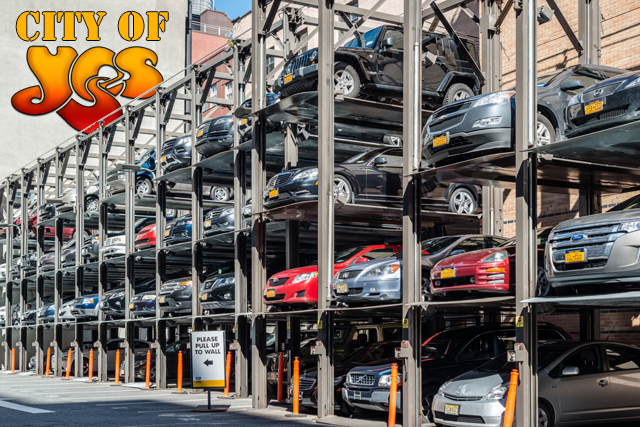It was the best of times, it was the meh of times.
Two Brooklyn community boards, representing neighborhoods with starkly different demographics, gave mixed signals on Mayor Adams's sweeping housing plan the same night this week, with a panel in a richer neighborhood giving its unanimous support while members of a low-income neighborhood's board gave a caveat-filled maybe, arguing about the goal of eliminating required parking.
CB6, encompassing Park Slope and several wealthy neighborhoods nearby, was a full-throated "Yes," even for what has become the most-contentious part of the mayor's City of Yes for Housing Opportunity: the proposal to rid the city of costly parking mandates for new development.
On the same night, some CB7 members objected to the removal of parking mandates, depriving the Sunset Park panel of similar consensus on City of Yes. It's a dynamic that is playing out across the city, as many neighborhood panels debate the City of Yes zoning plan.
Removing parking mandates is just one part of the sprawling proposal, but it is essential. Parking is costly to build, which results in underbuilding in order to not trigger mandates, or higher rents to offset the cost of the parking. How does this play out? On Clarendon Road in Flatbush, walking distance from the 2/5 train, the developer at 2809 Clarendon built 16 units, which required parking, while the developer at 2819 Clarendon only built nine units so he could avoid the parking requirements.
City of Yes would not eliminate parking; it would simply allow developers to decide whether to include parking or not.
Initially, CB7 board members proposed modifications to require more affordable housing and reduce the height of new developments, but the discussion only revealed another rift: several members of the board objected to the notion that developers wouldn't be required to build parking, claiming that new buildings without on-site parking would create more competition for "free" street "parking."
“What you’re doing is putting cars onto the street. Just because you get rid of [the mandate] doesn’t mean the cars disappear,” said board member Jeremy Kaplan. (In one sense, it does; studies show that new tenants who have a guaranteed parking space are more likely to buy cars — which contributes to congestion.)
Antoinette Martinez, the Housing Committee chair, led the charge in defense of the requirement that developers build parking. She claimed that other neighborhoods in Brooklyn have low-income people of color who need their cars to drive to work.
“There are many areas in New York City that are not easily accessible by public transit,” said Martinez, “These are areas where predominantly racial and ethnic minorities reside, many professionals in these areas depend on new construction including parking for their vehicles they use to get to work.”
Martinez cited Canarsie, East New York, and Brownsville as examples. All three of these communities are majority Black, but none has a majority of residents who drive to work. In Canarsie, around 50 percent of residents rely on public transit to get to their jobs, in East New York, 56 percent, and in Brownsville, it's 68 percent.
The board members ended up voting to recommend that City of Yes keep parking mandates.
At Community Board 6’s vote, things went a bit differently. The board voted the plan through with no conflict, not even the controversial parking proposal.
“It was a very smooth vote. 'City of Yes' was unanimous,” said Mike Racioppo, the CB6 district manager. He added that the mayor’s plan will help solve the city’s housing issues, in part by reducing developers' costs, which are inflated by the need to create parking.
Both boards have populations of around 120,000 people with around 43 percent household car ownership, but demographically the two communities are very different. Community Board 6, which includes wealthy neighborhoods like Cobble Hill and Park Slope, is 61 percent white, with 41 percent of households making over $200,000 a year. Community Board 7, which includes Sunset Park, is 27 percent white, 41 percent Latino, and 25 percent Asian; only 17 percent of the households make over $200,000 per year, according to the Census.
Boards 6 and 7 not only differ demographically, but also in their voting history. Board 7 has historically voted down or failed to reach consensus on rezoning that would promote development in Sunset Park. Community Board 6 was the second board in the city to push for universal daylighting as well as the only board to approve a district-wide rezoning.
“Our positions, unfortunately, are different from the median board across the city,” said Racioppo.
Followed by our (@BrooklynCB6 ) unanimous (besides 2 abstentions ) to support @NYCPlanning ‘s #cityofyes got housing opportunity! https://t.co/sTsHS6oafY
— Mike Racioppo (@RacioppoMike) June 12, 2024
Community boards are running out of time to make their official recommendations about City of Yes. Although the community boards serve a purely advisory role, Council members look to them as reflections of their constituents' opinions. It is up to the City Planning Commission and the City Council to make official modifications to the plan.






